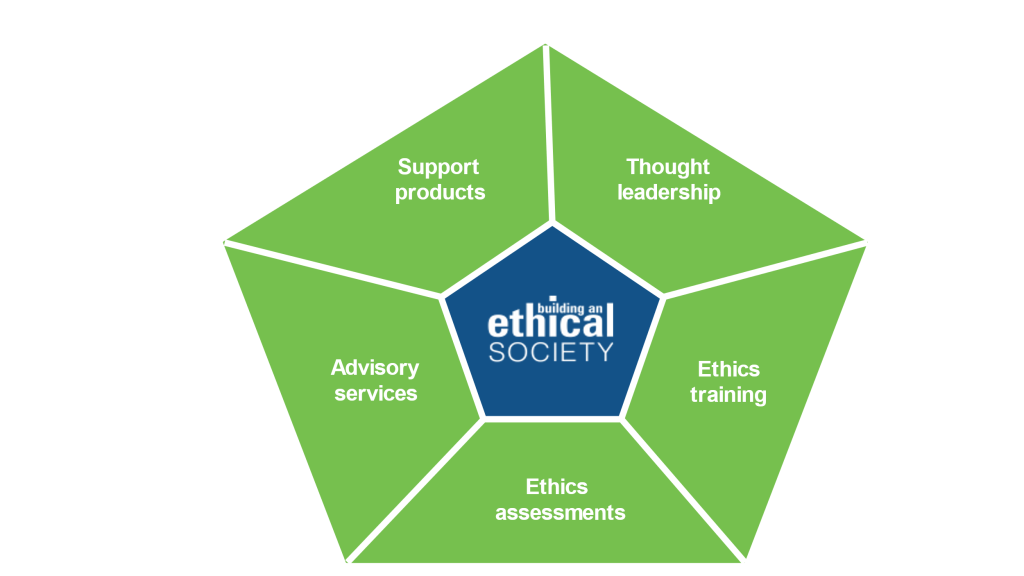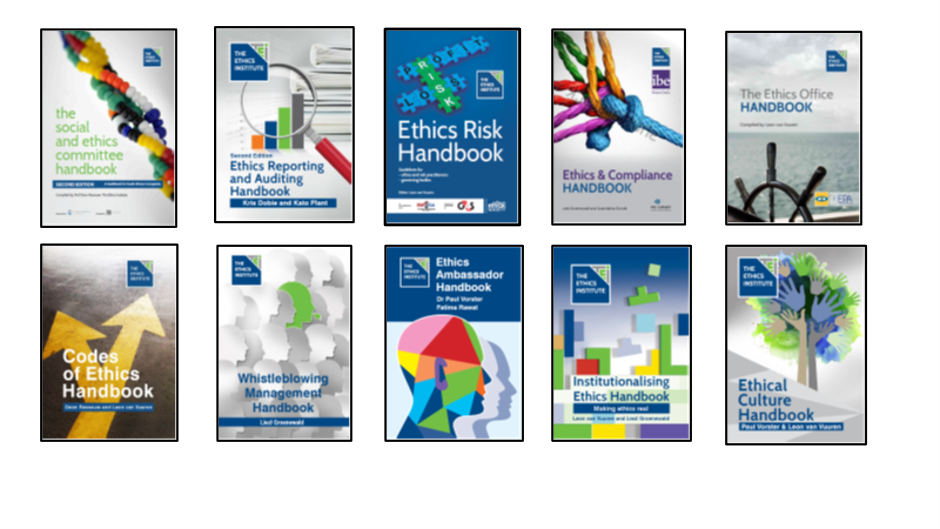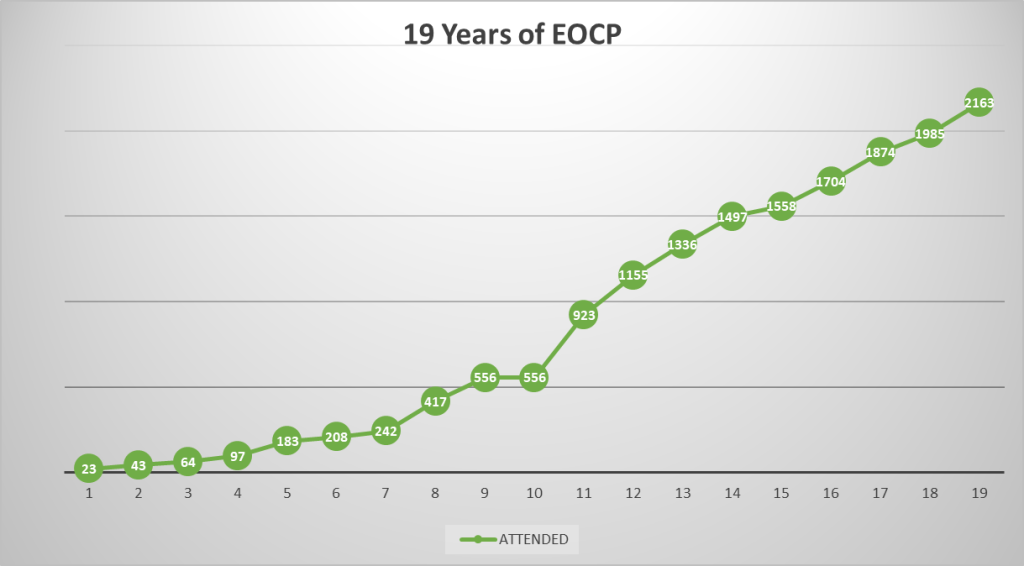The Ethics Institute: Partner Profile Article

Introduction
The Ethics Institute commenced operations in Pretoria, South Africa in 2000, with an initial focus on healthcare ethics. Over time, our focus shifted to organisational ethics. This focus on organisational ethics is grounded in our conviction that ethical development mostly occurs through social interaction in shared settings. In our case, the ‘social settings’ on whose social practices we focus are organisations in the public, state-owned and private sectors, as well as professional associations. In this way, we strive to build an ethically responsible society
Our subject matter experts are drawn from these four environments and have many years of experience in these focal areas – as both academics and practitioners – and our corporate services staff ensure that internal and external operations run smoothly.
The Ethics Institute is an independent institute producing original thought leadership and offering a range of services and products related to organisational ethics. The organisation is governed by a board of directors consisting of prominent persons committed to promoting ethical responsibility.
When The Ethics Institute started its operations in 2000, it was called the Ethics Institute of South Africa. However, over the years the Institute was invited to provide training and services to other countries in Africa, the Middle EAST, Europe, the UK and North America. By 2016 it became clear that the geographical reach of the Institute has expanded so far that it would make sense to remove South Africa out of the name of the Institute. The name of the Institute was thus changed to The Ethics Institute, or TEI, for short.
TEI is a non-profit, non-government organisation and operates simultaneously as an independent public benefit institute and as a social enterprise. In the former role, TEI produces freely available research and contributes to national and international ethics standard setting and policy making. In the latter role, we render a wide variety of services to paying clients and secure funding from large organisations for specific projects. Any profit made is reinvested in the capacity to undertake more research, and to render additional services and products, in pursuit of our vision of building ethically responsible societies.
Core activities
The Ethics Institute is involved in five core activities, which are thought leadership, training, assessments, advisory work, and product development – as displayed in the figure below.

- Thought leadership
TEI generate original research that focuses on the capacity of organisations and professions to deal with the ethics challenges and opportunities they encounter. All findings are made available publicly as a means of creating ethical awareness and stimulating debate on ethical issues. Wherever possible, we participate in policy-making and standard-setting processes related to ethics in the private and public sectors, state-owned entities as well as in professional associations.
As part of our thought leadership TEI started a publication series in 2012. Over the last decade a total of ten publications have been published in this Ethics Handbook Series. All the titles in this handbook series are available for free download on the website of TEI (www.tei.org.za). All these handbooks focus on providing practical guidance to practitioners involved in the governance and management of ethics in organisations. The titles in the handbook series are displayed below.

- Ethics training
Our training programmes are designed to capacitate organisations in effectively governing and managing ethics. We provide a wide variety of training programmes to the private sector, state-owned enterprises, the public service, and professional associations. The training is offered in both physical and virtual settings, as well as in online training programmes. Some of the programmes are also available in Portuguese and French.
TEI’s flagship training programme is the Ethics Officer Certification Programme. It was first introduced in 2004. The programme is presented as either a five-day contact programme, or an online programme over a period of four weeks, followed by a practical assignment that must be completed over a further three months period. This practicum consists of a portfolio of evidence of ethics management interventions that candidates have to compile. Accreditation for this course is done through the University of Stellenbosch Business School Executive Development, TEI’s academic partner in offering this course. We present bespoke private sector as well as public sector versions of the programme that are open to any organisation in these sectors, as well as in-house private sector and public sector programmes delivered to specific client organisations. The graph below shows the cumulative number of more than 2 160 persons trained on 140 editions of program over the last 19 years.

- Ethics assessments
Organisations are able to have their ethics performance formally assessed, for the purposes of gauging their current performance and developing a strategy going forward. For this purpose, TEI has developed its own assessment instruments, which have all been rigorously tested and normed. Specialised assessment instruments have been developed for assessing ethical conduct risk in organisations, for auditing the maturity of ethics management programmes, processes and structures in organisations, as well as for assessing the maturity or the ethical culture of an organisation. Because most of these instruments are standardised and normed, organisations can compare their ethics risk profile or the maturity of their ethical culture with those of their industry peers. These assessment instruments compare well with the best available instruments in the world. Most of the assessments can be completed online.
In addition to these assessment instruments, TEI has also developed its own audit standard for assessing safe reporting (whistleblowing) systems. The purpose of assessing these systems through an annual audit is to provide assurance to potential reporters of unethical or illegal conduct that their reports will be handled in a professional manner, and that their identity will not be revealed should they select to submit an anonymous report.
- Advisory services
TEI also provides advice to organisations on how to increase the effectiveness of their ethics interventions in the form of one-on-one or group sessions for all organisational levels. Our advisory services are tailored to the specific requirements of the client organisation. Advice is provided on all aspects of the governance and management of ethics. This can include advice on the development of codes of ethics and ethics-related policies, like whistleblowing, gifts, or conflict of interest policies. It can also include advice on setting up governance and management of ethics structures, or advice on improving the trust in, and effectiveness of a safe reporting mechanism.
- Product development
TEI is also involved in developing a wide range of physical and digital products that can be used in training programmes, and in the governance and management of ethics in organisations. Our product portfolio comprises various training videos, ethics applications (apps), and online-programmes that can be purchased by organisations for their own internal use.
One of our flagship products is the Ethically Aware Supplier Induction (or EASI) programme. This interactive programme with animated video content, case-studies, practical scenarios and exercises serves as a comprehensive training programme for raising awareness on ethical business practices in small and medium enterprises. It is typically procured by large organisations to train their small and medium suppliers on ethical business practices. The successful completion of the EASI program provides an opportunity for small and medium suppliers to be accredited as ‘Ethically Aware’ suppliers. Besides the original English version of the EASI programme, it is also available in Portuguese and French. More information on this programme is available on the programme’s dedicated website: https://easi-online.org/.
Funded projects
TEI is involved in coordinating two large-scale projects under the Siemens Integrity Initiative, which was created as part of the World Bank–Siemens AG comprehensive settlement agreed in 2009. Over the course of three funding rounds which commenced in 2010, Siemens is making US$100 million available to anti-corruption projects around the world. After being a successful bidder for two projects in the first funding round (2010–2014), TEI again successfully bid for funding for two projects in the second round (2015–2019) and successfully completed these projects. For a third time, TEI successfully bid for two projects in the final funding round (2020–2024) and is currently involved in executing these projects in South Africa and Mozambique.
The South African project is aimed at using strategic levers of ethical change to combat municipal and procurement corruption in South Africa. The objectives of this project are: (1) to reduce political pressure for corruption in South African municipalities through the development and adoption of a Code for Ethical Governance; (2) to mainstream a structured anti-corruption training and accreditation system for suppliers through the Ethically Aware Supplier Induction programme; and (3) to build capacity in the Provincial Government of one of South Africa’s provinces (Gauteng Province) to support municipalities in sustainably institutionalising their ethics management programmes.
The Mozambican programme is focused on enhancing the ease of doing business in Mozambique. The objectives of this project are: (1) to establish and maintain a collective action Coalition for Organisational Integrity in Mozambique; (2) to build ethics management capacity within the member companies of the Coalition for Organisational Integrity; and (3) to build ethics and anti-corruption capacity in small and medium enterprise suppliers.
For more information on The Ethics Institute as well as for access to the free knowledge resources offered by TEI, please visit www.tei.org.za.
About the Author:
Prof Deon Rossouw is the CEO of The Ethics Institute (based in Pretoria), and an Extraordinary Professor in Philosophy at the University of Stellenbosch. He is an internationally recognized expert in Business Ethics and the Ethics of Corporate Governance, and published several books as well as academic articles in leading international journals.
He was the Founding President of the Business Ethics Network of Africa (BEN-Africa) and served as President of the International Society of Business, Economics and Ethics (ISBEE). Deon is a member of the King Committee for Corporate Governance in South Africa, and was recognized as a Chartered Director by the Institute of Directors in South Africa.